
Think Again: Are Education Programs for High Achievers Inherently Inequitable?
This brief challenges the notion that marginalized students of high ability are harmed by advanced education, with implications for better screening measures and expansion of programs.
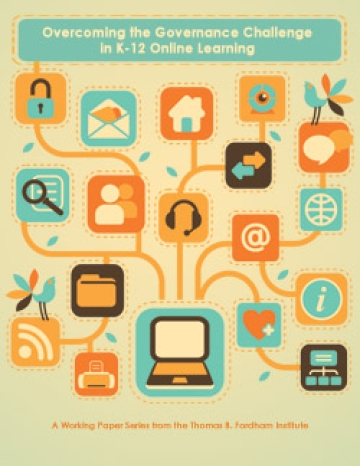
Overcoming the Governance Challenge in K-12 Online Learning
In this paper, John Chubb examines how local school district control retards the widespread use of instructional technologies. He argues that the surest way to break down the system’s inherent resistance to technology is to shift control from the local district—and thus the school board—and put it in the hands of states. Download the paper to read the ten steps Chubb argues will get us to this brave new governance system.
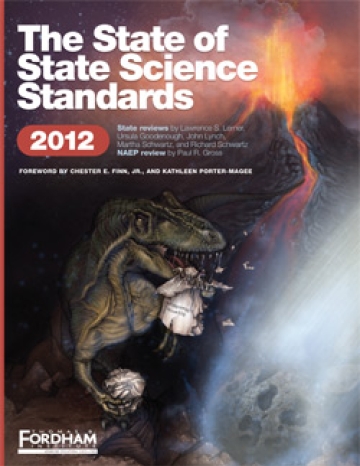
The State of State Science Standards 2012
American science performance is lagging as the economy becomes increasingly high tech, but our current science standards are doing little to solve the problem.
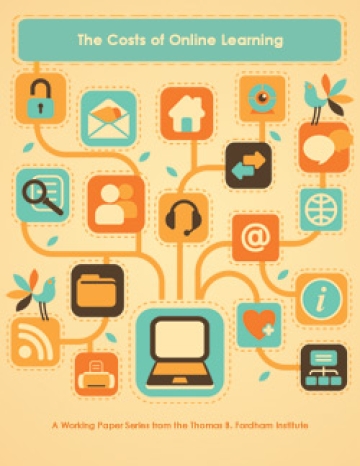
The Costs of Online Learning
The latest installment of Fordham's Creating Sound Policy for Digital Learning series investigates one of the more controversial aspects of digital learning: How much does it cost? In this paper, the Parthenon Group uses interviews with more than fifty vendors and online-schooling experts to estimate today's average per-pupil cost for a variety of schooling models, traditional and online, and presents a nuanced analysis of the important variance in cost between different school designs.
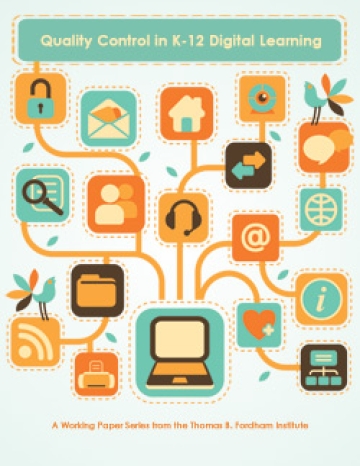
Quality Control in K-12 Digital Learning: Three (Imperfect) Approaches
Will the move toward virtual and “blended learning” schools in American education repeat the mistakes of the charter-school movement, or will it learn from them? The Thomas B. Fordham Institute, with the support of the Charles and Helen Schwab Foundation, has commissioned five deep-thought papers that, together, address the thorniest policy issues surrounding digital learning. The goal is to boost the prospects for successful online learning (both substantively and politically) over the long run. In this first of six papers on digital learning commissioned by the Thomas B. Fordham Institute, Frederick M. Hess explores the challenges of quality control.
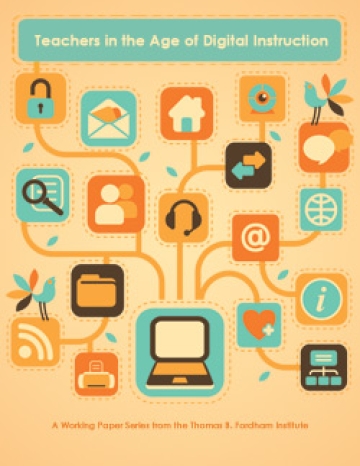
Teachers in the Age of Digital Instruction
Will the move toward virtual and “blended learning” schools in American education repeat the mistakes of the charter-school movement, or will it learn from them? The Thomas B. Fordham Institute, with the support of the Charles and Helen Schwab Foundation, has commissioned five deep-thought papers that, together, address the thorniest policy issues surrounding digital learning. The goal is to boost the prospects for successful online learning (both substantively and politically) over the long run.
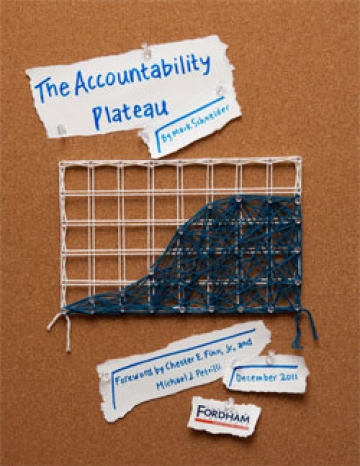
The Accountability Plateau
After more than ten years under NCLB, that law’s legacy continues to be fiercely contested. This analysis of NAEP scores—focusing on Texas and on the entire nation—by former NCES commissioner Mark Schneider finds that solid gains in math achievement coincided with the advent of "consequential accountability," first in the trailblazing Lone Star State and a few other pioneer states, then across the land with the implementation of NCLB. But Schneider warns that the recent plateau in Texas math scores may foreshadow a coming stagnation in the country’s performance. Has the testing-and-accountability movement as we know it run out of steam? How else might we rekindle our nation’s education progress?
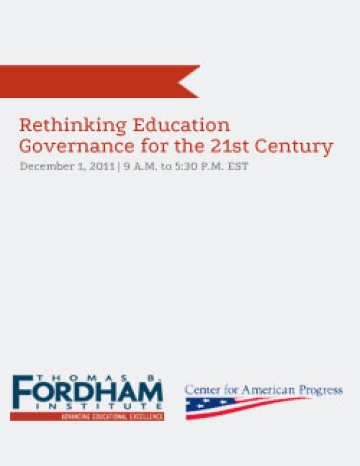
Rethinking Education Governance for the Twenty-First Century
School reforms abound today, yet even the boldest and most imaginative among them have produced—at best—marginal gains in student achievement. What America needs in the twenty-first century is a far more profound version of education reform. Instead of shoveling yet more policies, programs, and practices into our current system, we must deepen our understanding of the obstacles to reform that are posed by existing structures, governance arrangements, and power relationships. Yet few education reformers—or public officials—have been willing to delve into this touchy territory.
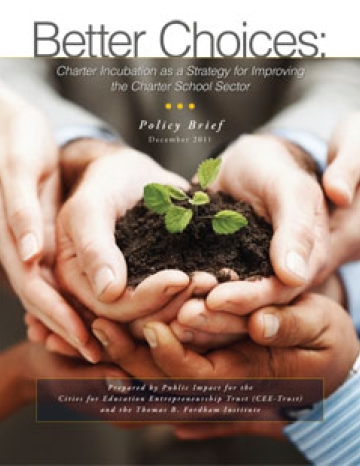
Better Choices: Charter Incubation as a Strategy for Improving the Charter School Sector
In this policy brief, Public Impact??s Joe Ableidinger and Julie Kowal examine the merits of the incubation model, outline specific strategies for supporting it, and profile organizations around the U.S. putting it into practice. The authors explain that through the strategic recruitment, selection, and training of talented leaders???and support of them as they launch or expand new charter schools???incubators offer charter school advocates an important tool in guaranteeing quality school choice.
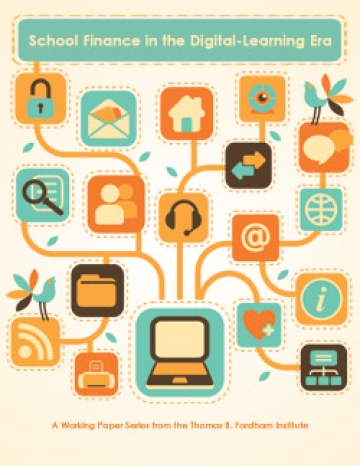
School Finance in the Digital-Learning Era
Will the move toward virtual and “blended learning” schools in American education repeat the mistakes of the charter-school movement, or will it learn from them? The Thomas B. Fordham Institute, with the support of the Charles and Helen Schwab Foundation, has commissioned five deep-thought papers that, together, address the thorniest policy issues surrounding digital learning. The goal is to boost the prospects for successful online learning (both substantively and politically) over the long run.
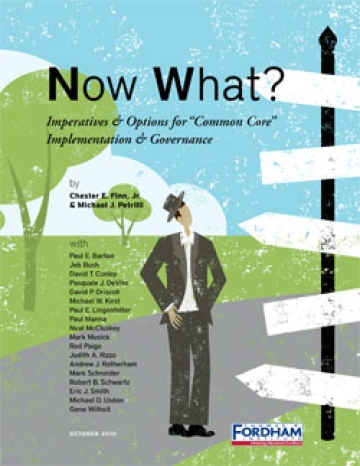
Now What? Imperatives and Options for Common Core Implementation and Governance
This Fordham Institute publication—co-authored by President Chester E. Finn Jr. and VP Michael J. Petrilli—pushes folks to think about what comes next in the journey to common education standards and tests. Most states have adopted the Common Core English language arts and math standards, and most are also working on common assessments. But...now what? The standards won't implement themselves, but unless they are adopted in the classroom, nothing much will change. What implementation tasks are most urgent? What should be done across state lines? What should be left to individual states, districts, and private markets? Perhaps most perplexing, who will govern and own these standards and tests ten or twenty years from now?
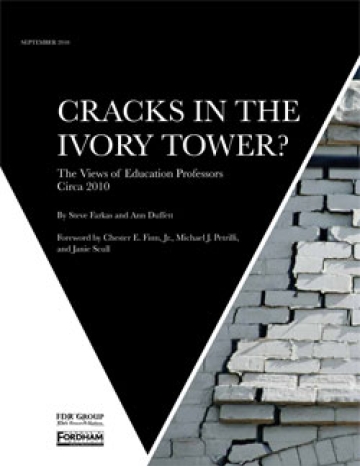
Cracks in the Ivory Tower? The Views of Education Professors Circa 2010
This national survey of education school professors finds that, even as the U.S. grows more practical and demanding when it comes to K-12 education, most of the professoriate simply isn't there. They see themselves more as philosophers and agents of social change, not as master craftsmen sharing tradecraft. They also resist some promising reforms such as tying teacher pay to student test scores. Still, education professors are reform-minded in some areas, including tougher policies for awarding tenure to teachers and financial incentives for those who teach in tough neighborhoods. Read on to find out more.
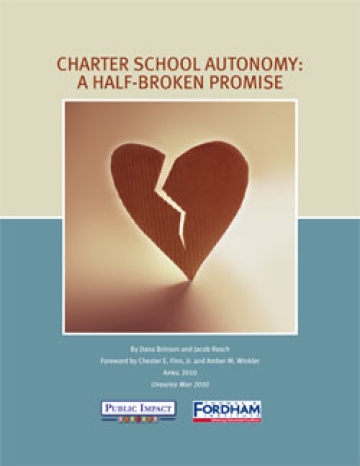
Charter School Autonomy: A Half-Broken Promise
The typical U.S. charter school lacks the autonomy it needs to succeed, once state, authorizer, and other impositions are considered. For some schools—in some states, with some authorizers—the picture is brighter but for many it's bleak. State-specific grades for charter autonomy range from A to F.